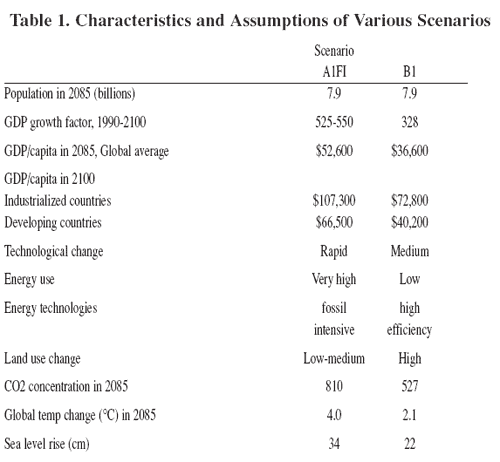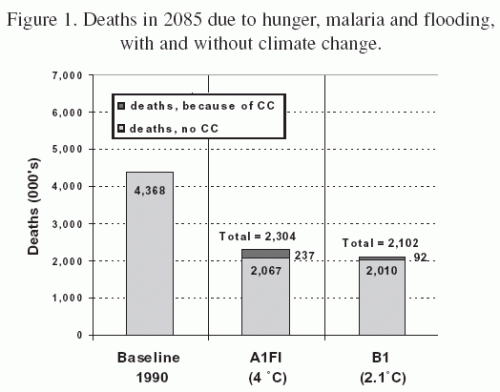Banning Dissent, Even in Science
I am constantly amazed at the totalitarianism of the global warming community and their absolute intolerance of dissent. One suspects that a reason more people are skeptical of alarmist predictions is that they know enough about human behavior to distrust someone who claims to be correct but refuses to respond to or even allow questions or replication.
Anthony Watt has a good example from the world of polar bears:
Exile for non-believers (PDF, press release)
Mitchell Taylor is a world's leading polar bear expert. He has studied a greater number of polar bear populations than anyone else. He has caught more polar bears than anyone else.
He was going to attend the 2009 meeting of the Polar Bear Specialist Group (PBSG). The name sounds technical, doesn't it? Unfortunately, in one of his papers, he wrote this somewhat self-evident, yet detailed, balanced, and carefully worded description of the polar bears' situation:
"The concern that polar bears will decline if the climate continues to warm is valid. However, the assertion that polar bears will become extinct unless immediate measures are taken to curb greenhouse gas emissions is irrational because it is inconsistent with the long-term persistence of polar bears through previous periods of warming and cooling; and because the IPCC climate model predictions 50 and 100 years into the future do not suggest a future with insufficient sea ice to support polar bears as a viable species."
What was the answer? He wasn't allowed to participate. Here is Mr Andrew Derocher's letter:
Hi Mitch,
The world is a political place and for polar bears, more so now than ever before. I have no problem with dissenting views as long as they are supportable by logic, scientific reasoning, and the literature.
I do believe, as do many PBSG members, that for the sake of polar bear conservation, views that run counter to human induced climate change are extremely unhelpful. In this vein, your positions and statements in the Manhattan Declaration, the Frontier Institute, and the Science and Public Policy Institute are inconsistent with positions taken by the PBSG.
I too was not surprised by the members not endorsing an invitation. Nothing I heard had to do with your science on harvesting or your research on polar bears - it was the positions you've taken on global warming that brought opposition.
Time will tell who is correct but the scientific literature is not on the side of those arguing against human induced climate change. I look forward to having someone else chair the PBSG.
Best regards,
Andy (Derocher)
If you are not familiar with Taylor's positions that are alluded to, as I understand it they include: 1) The fact that most polar bear populations have been rising rather than falling over the last decades and 2) polar bears have survived interglacial periods in which we believe all sea ice disappeared.
Most of y'all know I have a parallel blog on climate over at Climate Skeptic. I get accused of being "anti-science" all the time, I suppose for pursuing scientific evidence where it takes me rather than accepting the scientific "consensus" that I am told I should shut up and accept.
One response I often make to this accusation is the to compare the comment policy of leading skeptic and alarmist climate sites. Which seem more "anti-science" to you? Here is part of my blog's comment policy:
I have never tried to moderate my comments (except for spam, which is why you might have a comment with embedded links held for moderation "†I am looking to filter people selling male enhancement products, not people who disagree with me.) In fact, I relish buffoons who disagree with me when they make an ass of themselves - after all, as Napoleon said, never interrupt an enemy when he is making a mistake. And besides, I think it makes a nice contrast with a number of leading climate alarmist sites that do not accept comments or are Stalinist in purging dissent from them.
Leading sites that are skeptical or at least are willing to ask questions of the climate orthodoxy like Watt's Up with That or Climate Audit have similar policies - their comment threads are full of people with strongly opposing opinions to the site's authors.
Now check out a comment policy from an alarmist site:
Climate "skepticism" is not a morally defensible position. The debate is over, and it's been over for quite some time, especially on this blog.
We will delete comments which deny the absolutely overwhelming scientific consensus on climate change, just as we would delete comments which questioned the reality of the Holocaust or the equal mental capacities and worth of human beings of different ethnic groups. Such "debates" are merely the morally indefensible trying to cover itself in the cloth of intellectual tolerance.
So, if you're a climate skeptic, you may be well-intentioned and you're certainly welcome to your opinion, but we're not interested.
The leading alarmist site, Real Climate, founded and run by people the media portrays as leaders in climate science, such as James Hansen, routinely purge all dissent from posts and comments. For example, Anthony Watt wrote this after Steve McIntyre found huge problems in a recent version of a hockey stick temperature recontruction:
Realclimate.org continues deleting the ongoing river of comments posted on their threads ( Note: Any of you who find that your posts to those sites are being rejected {as usual without any explanation} can keep a copy of the post, and post it at http://rcrejects.wordpress.com if you want
I find that amazing -- someone is maintaining a blog populated with everything the "leading scientists" at Real Climate purge. Check the stuff out there, this is not foul-mouthed mindless rants, but real scientific challenges that are being deleted.
One of the dirty secrets of climate science is that the so called "settled" science of global warming is often never challenged or replicated as we expect science should be. When someone claims to have produced cold fusion, if they want their work to be accepted it is their obligation to publish their data and methodology for others to try to replicated. In climate, this seldom happens. Members of a small community all replicate and review each others' results, and claim this to be sufficient for "consensus." When outsiders or mavericks attempt to test or replicate the results, they are stonewalled.
Here is my favorite quote to illustrate the whole mindset, and should make any reasonable person nervous who understands that Congress is on the verge of committing trillions of dollars of our money to certain courses of action based on the science. It is from Phil Jones, who put together one of the first global temperature metrics at the Hadley Center, to Warwick Hughes, an Australian scientist who had some questions about the data and was having trouble replicating some of Jones' results. Jones wrote, in response to Hughes request for data (data which underlies much of the early IPCC reports and so is the basis for a lot of public policy discussion):
"We have 25 years or so invested in the work. Why should I make the data available to you, when your aim is to try and find something wrong with it?"
UPDATE: Here is a great example of the way it should be done -- Steve McIntyre posts Keith Briffa's response in full, invites other responses:
In spite of suffering a serious illness (which I understand to be a kidney problem), Keith Briffa has taken the time to comment on the Yamal situation. The comment should be read by interested readers. If Briffa or any of his associates wishes to post a thread here without any editorial control on my part, they are welcome to do so.

